Reports
Unearthing the buried soul: Homo naledi and the evolution of hominin mortuary practices
19 July 2021
How have awareness of mortality and the rituals associated with death and treatment of human remains evolved over time? Is modern Homo sapiens unique in our multi-stage reactions to grief, bereavement and mourning, and in our complex mortuary practices, or is there a continuum with ancestral hominin behaviours and with those of our more distant primate relatives?
These are just some of the questions explored by Dr Patrick Randolf-Quinney, a biological and forensic anthropologist from Northumbria University in Newcastle upon Tyne, in his fascinating talk on the evolution of ritualised hominin mortuary behaviours.
He brought to life the challenge of mapping and cataloguing remains in the virtually inaccessible Dinaledi and Lesedi chambers of the Rising Star cave system (dated to between 236 and 335,000 years ago), which have yielded the richest hominin assemblage recovered on the African continent to date: over 1600 fossil specimens attributed to the taxon Homo naledi.
Dr Randolph-Quinney walked us through the evidence that the remains of H. naledi were deliberately introduced into the chamber through the practice of funerary caching – the structured deposition of remains in a chosen place - a remarkable mortuary behaviour given the small brain size of Homo naledi.
The development of specific mortuary practices was contextualised throughout the talk, in vivid descriptions of the evolution of the whole diversity of human behaviours in our ancestors in Africa, giving the audience insight into the evolutionary, ethological and cultural contexts in which mortuary behaviours may have developed.
Also intriguing was how micro-computed tomography is used to recreate virtual models of ancient specimens in situ, and how anthropologists’ investigative methods have developed over the years, enabling new interpretations of the evidence and enhancing our understanding of human evolution. Explaining the analysis of cultural transmission of ritualised behaviours, Dr Randolph-Quinney revealed the implications for the African archaeological record and highlighted our current understanding of the origins of our own species, as well as the open questions still to be investigated.
Dr Henrietta Standley FRSB
Substance Abuse: Life and Death perspectives
12 July 2021
The event commenced with an informative presentation by Dr Walter Tasosa, senior mental health nurse and lecturer in mental health nursing at the University of South Wales, who provided a thought provoking insight into his recent research into the ethnographic aspects of alcohol abuse in the Zimbabwean migrant community in the UK, exploring potential harm reduction strategies.
The total estimated annual cost of alcohol related harm in the UK, £21 billion, was contrasted with the (anonymised) life experiences of individuals affected, highlighting how alcohol abuse and addiction and related physical and psychological harm arises from its use as an individual and collective coping strategy in a traumatised community where the very act of reaching out to seek much needed support could result in deportation. The financial cost and social cost of alcohol related harm was thus emotively and starkly contrasted with the very human cost that can often be too easily divorced from mere statistics.
Dr Tasosa’s talk was followed by a presentation from renowned Cardiff University home office forensic pathologist Dr Stephen Leadbeatter on investigating cause of death due to substance abuse. As well as exploring the complexities and challenges of diagnosing cause of death from the toxicological perspective, Dr Leadbeatter provided a fascinating discussion on the short and long term pathological effects of alcohol and other substance abuse, also examining how intoxication and resultant disease informs indirect deaths from substance abuse due to accident and violence.
Dr Leadbeatter sensitively framed the issues he discussed in the wider psychosocial context of poverty, mental health and vulnerability, returning us once more to the overarching human cost of social marginalisation.
These engaging expert clinicians not only informed their audience of the impact of substance abuse on society, they reminded them what society should aspire to in caring for its vulnerable citizens.
Dr Steven J Walden CBiol MRSB
Huntington's Disease: Genetics, Ethics, and Hope for the Future
03 March 2021
Huntington’s disease is an incredibly complex topic. Dr. Yhnell’s lecture took her audience on a whirlwind tour through the clinical presentation of this debilitating disease, the challenges of clinical research, and recent advances in the field providing hope to patients and their families.
Despite the challenges of online delivery, Dr Yhnell’s talk was thoroughly engaging and provided plenty of opportunities for audience participation. The audience’s enjoyment of the lecture was exemplified by the diverse and insightful questions posed on everything from therapies for patients with Huntington’s to the ethics of genetic screening and patient confidentiality.
As someone with little prior knowledge of Huntington’s disease, this talk provided an excellent introduction. Most of us are familiar with the movement issues associated with Huntington’s but are less aware of the emotional, behavioural, and communication issues which can occur. I am sure I am not the only audience member who felt they were leaving with a greater understanding and appreciation for this disease and compassion for those who are affected and their families.
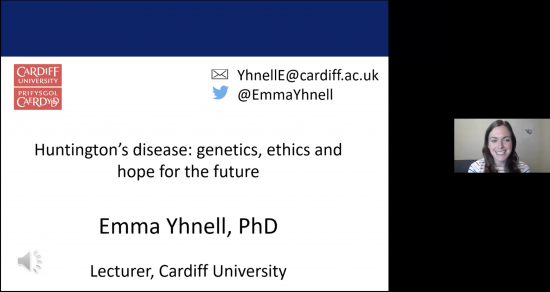
This was a joint event by the RSB South Wales nranch and Cardiff Scientific society, hosted virtually though Zoom, attended by 70 members and 12 student members of the Cardiff Scientific Society and 18 members of the Royal Society of Biology.
A huge thank you to Cardiff Scientific Society for hosting this event and to Dr Emma Yhnell.
Sarah Morgan MRSB
Wallace and the Caterpillars: A Colourful History of Discovery
22 June 2020
The annual Wallace talk, a collaborative event between the Royal Society of Biology’s South Wales branch and the Linnean Society, was delivered online for the first time ever.
Watch a recording of the event on the RSB YouTube channel
The event took place on Monday evening at the start of the Royal Entomological Societies' National Insect Week 2020. This was the branch’s first-ever online event and was a great success, attracting an audience of 75 guests.
This year's Alfred Russel Wallace talk was given by Eleanor Drinkwater, a PhD student at the University of York. Eleanor delivered a stimulating and exciting talk focussing on how Wallace embraced the debate surrounding animal colouration where he developed his theories, many of which are valid today. The key themes within this talk were how Wallace provided vital insights into his ideas of 'warning colouration' and his thoughts about animal 'camouflage', both of which are key to animal defences.
Eleanor's exciting talk took the audience on a journey of exploration with Wallace.
"She provided us with a collection of pictures and videos as examples of Wallace’s work on caterpillars, butterflies and orchid mantids" and "We were taken on a trip of exploration" were some comments made by attendees as feedback.
She provided us with a real feel for how his ideas on animal colouration have sparked controversy and debate among academics for centuries, yet have stood the test of time.
This fascinating and insightful talk was followed by a Q&A session where numerous questions came from a captivated audience. Afterwards, participants made it clear how much they had enjoyed their evening of an exploration of colour with Wallace.
Jason Williams-James MRSB
Dementia: Science and Society panel discussion
11 November 2019
The South Wales RSB branch hosted a panel event hearing from researchers and those with real world experience of dementia. Dr Mathew Clement of Cardiff University’s Division of Infection and Immunity started the talks by attempting to bridge the gap between viral immunology and neurology research. He spoke about the role of inflammation in dementia and how the immune response to certain infections could exacerbate symptoms.
Next up Dr Tim Hughes of the same division at Cardiff University outlined the complex nature of dementia symptoms and potential genetic and environmental risk factors including the link between poor gut microbe diversity and impaired cognition.
Dr Owen Peters (UK Dementia Research Institute, Cardiff) followed with a talk focusing on choice of model organism for neuroscientific research by elucidating on the benefits of Drosophila over mice in terms of a genetic focus to research. Benefits noted included ease and relatively low cost of rearing and studying flies. This contrasts with the first two speakers who use mice extensively in their studies.
Following Dr Peters, the attendees heard from Professor Andrea Tales (Swansea University) who spoke of the lesser recognised symptoms of dementias, including differences in visual functions like visual attention and processing, as well as personality changes and disorientation. Professor Tales made the case that care homes and points of information could be improved to highlight these other symptoms.
The series of talks was rounded off by Ms Leslie Butcher, a lecturer of Adult Nursing at Cardiff University’s School of Healthcare Sciences, who talked openly of her experiences working with people who have dementia and the real challenges they can face being in vulnerable settings.
The event was well attended with all attendees that gave feedback expressing that they would consider attending an event of this nature again in the future.
Samantha Hill AMRSB
Conversations with the Dead: Old Trails Lead to New Discoveries
25 March 2019
The South Wales branch of the Royal Society of Biology in collaboration with The Linnaean Society hosted esteemed curator Maxwell Barclay as he held a talk on his passion; natural history of Coleoptera. Max is the head curator of Coleoptera at the Natural History Museum in London and his tales of the journeys of many naturalists brought the winding routes of the history of insects under the spotlight.
An introduction was provided by Professor Dianne Edwards FRSB of the Linnaean Society. Max, who has over 80 species of beetle named in his honour, outlined how Natural History collections hold reams of unpublished scientific reference data, succinctly summed up on small labels alongside insect specimens collected from all climates, all countries, all ecological niches possible.
Beetles are the most diverse group of organisms based on current identifications of species, with around 400,000 extant species currently described. The Natural History Museum houses many type specimens from renowned enthusiasts such as Alfred Russell Wallace, Charles Darwin and Mary Kingsley.
It was divulged that the majority of specimens in museums are donated by hobbyist collectors and a wealth of information on past environments, climates and ecological states can be determined from such specimens and the information presented with them. Max highlighted the importance of appreciating and documenting the natural world before changes prevent us from describing it with any meaning.
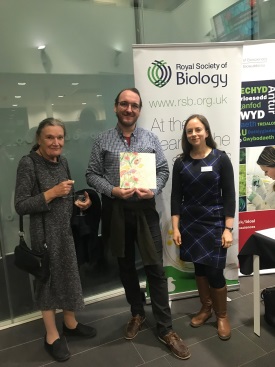 This event was well attended and thoroughly enjoyed by those who filled in feedback forms, with 100% of respondents saying they would attend similar events in the future.
This event was well attended and thoroughly enjoyed by those who filled in feedback forms, with 100% of respondents saying they would attend similar events in the future.
One attendee commented “Whoever would have thought that a curator of beetles in a museum could give such an enthralling talk. I was captivated”.
Photo was taken by Dr Rowena Jenkins MRSB. From left to right: Professor Dianne Edwards FRSB (Linnaean Society), Maxwell Barclay holding beetle artwork gifted by an attendee, Dr Henrietta Standley FRSB (Chair, South Wales branch).
Samantha Hill
Panel Discussion - Therapeutic uses of stem cells: a new medical revolution?
12 November 2018
The South Wales branch organised and enjoyed a thought-provoking evening of talks made by five of the leading researchers in stem cell related disciplines.
Dr David Edwards of Swansea University Medical School commenced the presentations with an insight into the benefits of using human induced pluripotent stem cells (IPSC) to study cardiac disease in cardiomyocytes. Heart cells have a very low turnover compared to other differentiated human cells, making this a vital research area.
Professor Yves-Alain Barde continued the evening showcasing some mesmerising photographs of neurons, the resultant cells of his work involving human embryonic stem cells; this avenue of research aims to generate therapies for nervous system conditions.
The panel continued with Professor Anne Rosser discussing her cutting edge work with neurodegenerative diseases and possible treatments using IPSCs to replace damaged neurons, such as occurs with the loss of medium spiny neurons in Huntington’s disease and dopamine producing neurons in Parkinson’s.
Professor Matt Smalley then spoke about his theories and practical work investigating the stem cell-like properties of cancer, and what they can predict for disease progression. This highlighted that basal stem cells remain in the body for longer than surface skin cells, increasing the chance of mutation within.
The presentations were wrapped up by Dr Lee Parry discussing the major topics of focus for the European Cancer Stem Cell Research Institute in Cardiff, including factors affecting bowel cancer, creating 3D ‘organoids’ for more meaningful research interpretation, and combining these tangible cell cultures to form more sincere bodily process models.
A short Q&A session followed, and guests along with speakers remained for light refreshment and networking after the main event. The event attracted over 100 attendees, with positive feedback received.
Samantha Hill
Yeast Power! at the Swansea Science Festival
4 November 2018
The Swansea Science Festival Family Weekend took place at the Waterfront Museum, Swansea, over the weekend of the 3rd and 4th November. The festival is in its 2nd year and is the legacy of the British Science Festival held in the city in 2016.
This year the South Wales branch, in conjunction with the Centre for Cytochrome P450 Biodiversity at the Swansea University Medical School, showcased the power and versatility of yeast. The stand was staffed by Claire Price MRSB, Josie Parker MRSB, Mark Williams, and Theo DeRancourt.
The stand was very busy, and attendees were astonished that dried yeast used to make something as common placed as bread could be used to make a foam fountain/elephant’s toothpaste! Much fun was had, and a huge mess was made!
Dr Claire Price MRSB
Science Careers Fair
2 November 2016
The South Wales branch attended and exhibited at the 2016 Science Careers Fair at Cardiff University. The stand was manned by Almero Barnard MRSB (South Wales university engagement officer) and by Dr Beatrix Fahnert FRSB (chair, South Wales branch).
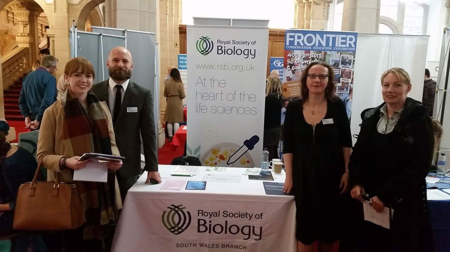
Photo was taken by Dr James Hindley; Almero Barnard (second from left) and Dr Beatrix Fahnert (second from right) with some of the students that visited the stand
The event was attended by a number of companies and entities advice and guidance on opportunities in science. The stand was visited by a number of final year students seeking information and advice, as well as first year students. We proceeded to offer advice on areas of the field we carried knowledge of and also gathered contact details for feedback the RSB could potentially offer on other topics. We also noted the advantages of joining/being part of the RSB to prospective members and it was well received.
We feel the event was a good platform for engagement with students and prospective RSB members and would plan to attend again in 2017. Overall, we feel the event was a success in engaging and providing guidance to science students, as well as promote the benefits to being a member of the RSB.
Almero Barnard MRSB
Gene Editing: What’s the point?
21 October 2016
The hot topic of gene editing / genetic manipulation was the chosen subject for the event “What’s the point of gene editing?” arranged by the South Wales branch of the Royal Society of Biology and hosted by the Darwin Centre, Haverfordwest College.
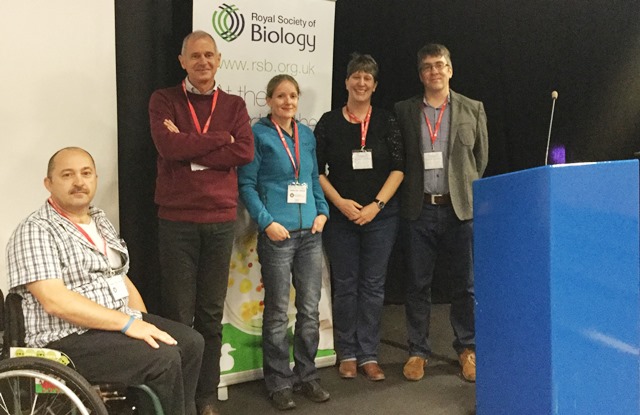
Four engaging speakers, Mr Alan Thomas, Founder of AtaxiaAndMe.org, Professor Paul Dyson, Swansea University, Dr Dafydd Jones, Cardiff University, and Dr Miranda Walker, Swansea University, presented their interests and personal viewpoint on gene editing to an audience of approximately 90 A level pupils, and a handful of teachers, from the West Wales region.
The pupils from Castle School, Pembroke School, Tasker Milward VC school, Pembrokeshire college and Milford Haven School were also able to interact with the hands on exhibits provided by Wales Gene Park, Wales Cancer Research Centre and the Royal Society of Biology’s 21st Century BioChallenges Activity Kits.
Post lunch, a lively and thought provoking debate, chaired by the South Wales branch’s school and public engagement officer Dr Karen Reed, further explored the ethics, risks and benefits associated with gene editing applications, and additionally covered topics including “the effect of Brexit on Welsh Research”, “the best routes to being a researcher” and “the importance of science communication to the general public”. One teacher commented that “this day has been the most relevant day out, please come back next year”, while a student feedback they “appreciated the insightful explanations and career advice”.
Dr Karen Reed
Cancer and stem cells: what’s all the fuss about?
5 September 2016
Along with Cancer Research UK, the South Wales branch hosted a lecture delivered by Dr Maddy Young from the European Cancer Stem Cell Research Institute at Cardiff University.
Dr Young provided a comprehensive overview of DNA, genes, and the processes of transcription and translation that see the genome’s messages interpreted by a cell and used for biological functions.
Dr Young went on to explain how gene mutations drive cancer formation and discussed the risk factors associated with cancer, before going on to discuss the concept of cancer stem cells and the implications this concept has for cancer therapies.
Finally Dr Young used examples of research undertaken at the European Cancer Stem Cell Research Institute to demonstrate the “workflow” of research from basic research examining the molecular causes of cancer and/or drug resistance to the application of this new knowledge in the development of novel therapies, finishing by showing how this can be translated into the clinic.
The event held to celebrate the work of the late Professor Alan Clarke, founder of the European Cancer Stem Cell Research Institute, was attended by circa 65 people and feedback highlighted how participants had “gained an understanding of the basics of how cancer is formed”, “how lifestyle choices influence cancer risk” and “how Cardiff is contributing to new research in cancer biology”. One participant commented “The lecture was pitched at a level I could understand and the speaker led us through complex ideas in a clear and engaging manner”.
Dr Karen Reed
Urey's geological thermometer
8 March 2016
Together with The Linnean Society, the South Wales branch held a celebratory lecture at the Wallace Lecture Theatre at Cardiff University, co-funded by the branch and the University's School of Earth and Ocean Sciences.
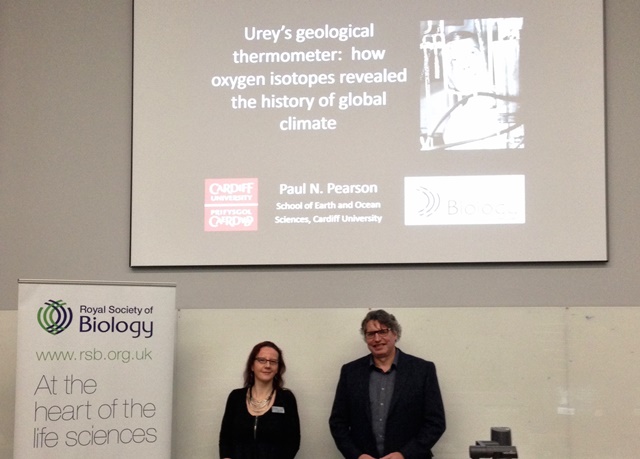
The event was chaired by Dr Beatrix Fahnert FRSB, chairperson of the South Wales branch committee.
Paul Pearson from Cardiff University gave a lecture titled Urey's geological thermometer: how oxygen isotopes revealed the history of global climate. He explained the work of the Nobel Prize winning physicist Harold Urey and his collaborators. In addition to his excellent presentation there were slides and interactive aids including a microscope set up to view the remnants of the small organisms (forams) to explain the work presented.
Feedback from attendees said the talk was "enjoyable, interesting and inspiring".
Dr Beatrix Fahnert FRSB
Synthetic Biology & Synthetic Life Panel Discussion
16 November 2015
Applications of new technologies and developments in context of synthetic biology and synthetic life can have a considerable impact on humans as well as the environment. Therefore, this proved to be an excellent topic for a rousing panel discussion.
The discussion covered many aspects of this fascinating field, including current foci and challenges of the topic, concepts of synthetic biology and synthetic life, as well as the technology and methodology involved. The panel also touched on the potential applications, and the societal and ethical implications of the field. Educational needs and future expectations were also addressed. Fundamentally, the discussion proved a broad introduction for many people to synthetic biology and the complexity of the term.
The panel for this discussion was comprised of a number of local academics from a range of scientific disciplines, including chemistry, biochemistry, and engineering. This diversity led to an interesting overview of the subject, which was chaired by Dr Beatrix Fahnert FRSB, chair of the South Wales branch.
As with all South Wales branch panel discussions, the event ended with a cheese and wine reception, which allowed for networking and further discussions on this fascinating subject to take place. 89 people attended and all left with "a better understanding of what synthetic biology is."
Dr Claire Price MRSB and Csaba Sárosi AMRSB
Demystifying DNA at the Cardiff Cancer Research Open Day
24 October 2015
Despite rain and the lure of a Rugby World Cup semi-final, our stand at the Cardiff Cancer Research Open Day attracted many visitors of all ages from Cardiff and further afield.
Lots of families with small children came to the stand, sparking further interest in biology. School children talked to us about future careers, and undergraduates deepened their subject understanding and explored potential careers. Twenty visitors extracted DNA from strawberries, fifteen studied their methylene-blue-stained cheek cells under the microscope, and far more engaged us in discussions.
Amazed by DNA becoming visible when extracted from strawberries, visitors literally had their eyes opened to the role of DNA in health and disease, all without expensive equipment and highly technical procedures performed by scientists.
Using an approach that can be easily repeated at home with washing up liquid, salt and alcohol truly demystified the enigma of DNA and lowered the perceived barriers of research.
Dr Beatrix Fahnert FRSB
Go Wild!
6 June 2015
The weather was not very kind as the South Wales branch headed to Pantside Community Woodland Park for this celebration of biodiversity, organised by Caerphilly County Borough.
As with all Go Wild events, it was intended to increase local people's awareness of the abundant wildlife on their doorstep. We had a rain shower before the 11:00 start and had to endure cold, gusting winds until the close at 16:00. Not what we expect in June!
There were several groups looking at different aspects of the local biodiversity. Branch members had a stand which concentrated on looking for animals in local soil samples. All the equipment used was either very cheap or free – even the microscopes were second-hand. The intention was to demonstrate that expensive items are not essential to do this sort of biology.
As expected, earthworms figured prominently but we were also able to look at millipedes, proturans and collembolans with the aid of the equipment. Both children and adults were fascinated by what they could see with the various types of lenses and microscopes. Hopefully, some of the schoolchildren were inspired to do some of their own microscope work in the future.
In spite of the weather, there were still a lot of visitors from the local community and from further afield.
John Vincent MRSB
Battling Infection
16 March 2015
Despite impressive scientific advances, infectious diseases remain one of the major threats to public health. As we have seen from recent events both locally and globally, there are still many controversial issues surrounding how we treat and prevent diseases ranging from measles to ebola. Therefore, the inaugural event of the recently established South Wales branch was an engaging audience-led panel discussion on battling infection.
The eminent panel was made up of a group of academic, medical and policy experts based in the South Wales region. The event was chaired by Dr Beatrix Fahnert FSB, chairperson of the South Wales branch committee.
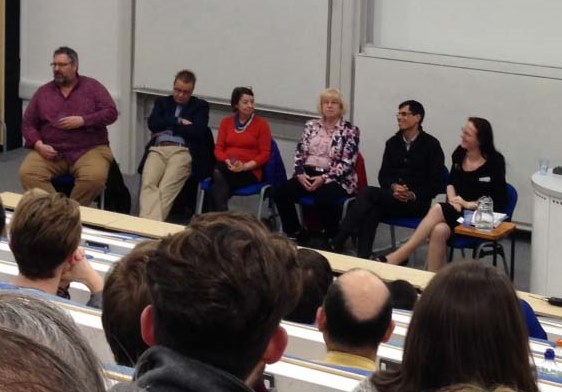
Credit: Almero Barnard MSB
The superb discussion covered a number of areas:
How the over-prescription of antibiotics for viral infections are promoting antibiotic resistance leading to a call for consistency in prescriptions by GPs (there is a link between high number of antibiotics prescribed and the areas of greatest deprivation) and the need for enhanced levels of education on the topic amongst the general public.
The "anti-vaxxer" movement, which is of great relevance at the moment due to the recent outbreak of measles in California and the 2013 and 2014 outbreaks in Neath and Swansea.
How vaccines, the lost art of home remedies and exposure to a "good dose of dirt" for children could stimulate the immune system, alleviate symptoms and reduce the over reliance on the medical systems and pharmaceuticals.
Whilst the discussion was the main focus of the event, there were also displays and demonstrations showcasing research in the field.
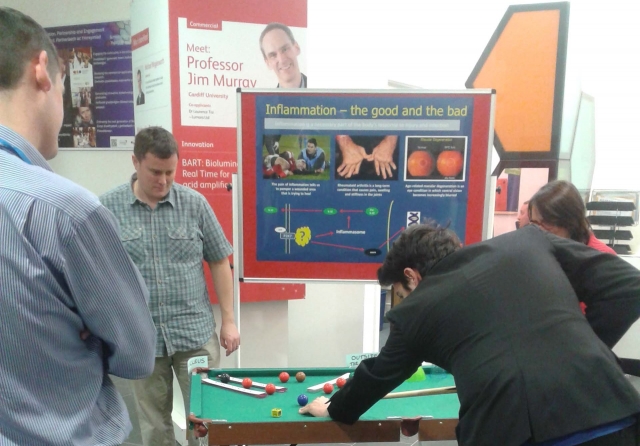
Credit: Dr Karen Reed
A cheese and wine reception also allowed further discussions and networking to take place.
This was an excellent first event for the branch which attracted 177 people and provided a great opportunity to meet and listen to experts in the field at a free local event.


